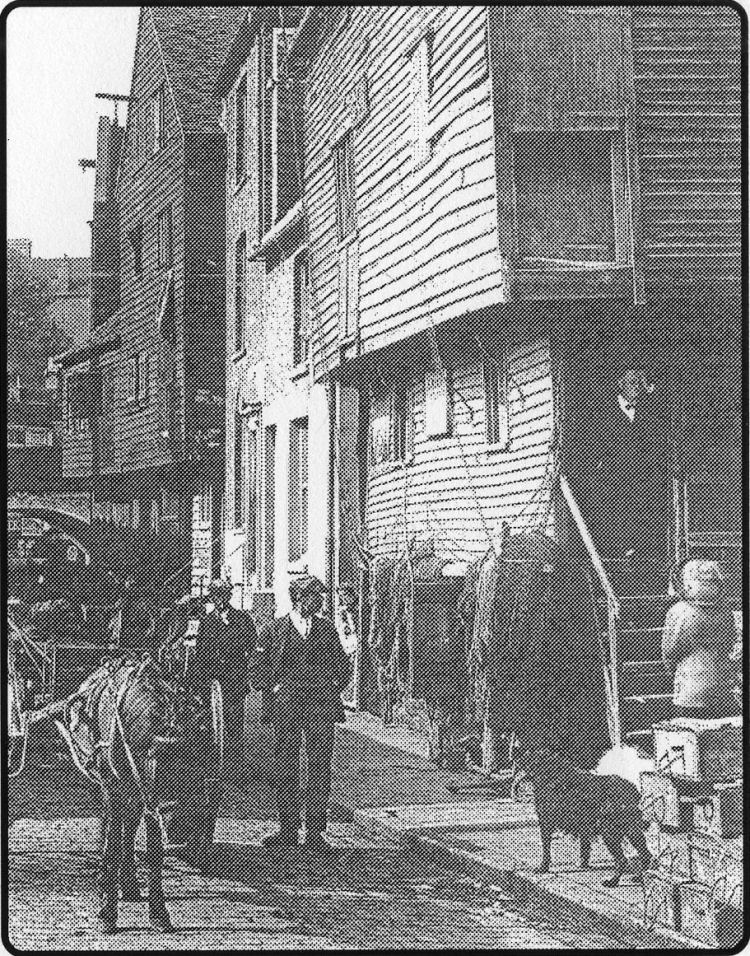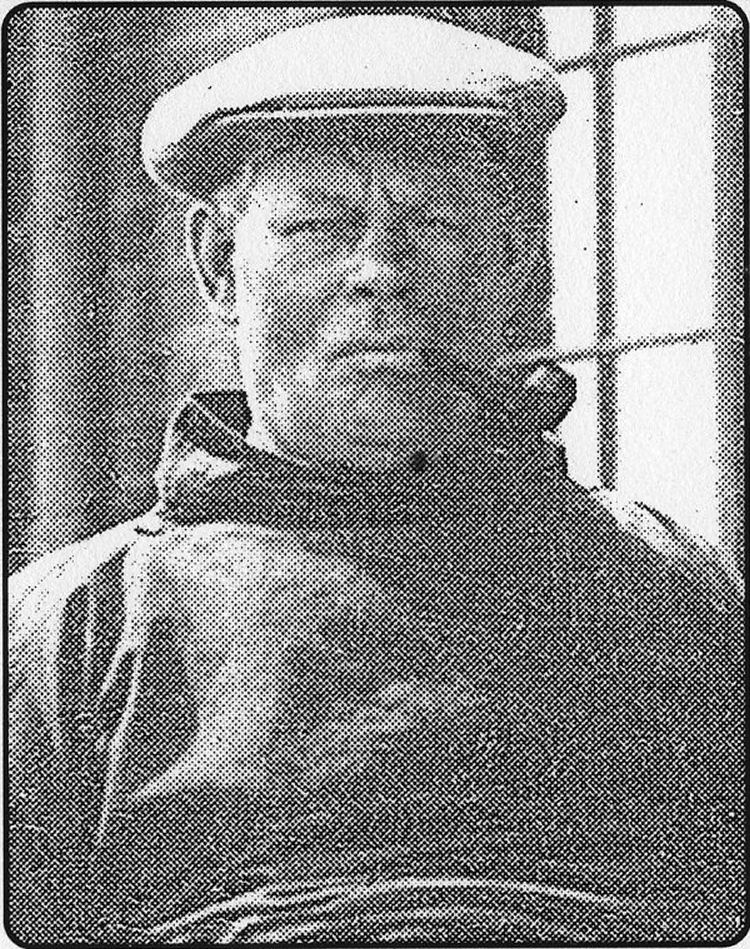
Published 29 March 2001

‘Hoggamy’ Hall
ANDY 'Cabby' Hall, 76, who lives in retirement at Hawkinge, was born and
brought up in the Folkestone Fishmarket area, of which he has many happy
memories, so it is hardly surprising he should follow his father into the
Royal Navy when he reached call-up age during the Second World War.
The youngest of four sons of Harry, also nicknamed 'Cabby' Hall, he was born
in East Street close to the Fishmarket while his father and grandfather were
both born not far away, at No. 1 The Stade - which he identified in a
photograph given to me by Edwin Lilley, of Seabrook.
Andy's eldest brother James, who lived in London and died about two years
ago, and second eldest, Harry, of Cheltenham, who died three years ago, both
served in the war as marine commandos, while his third brother, William
'Biddy' Hall served in the Royal Navy - as did their father, a veteran of
the First World War.
Harry had claimed he was older than he was to join up - and lied x again
about his age in order to J appear young enough to serve his
S country in the Second World War.
His father had it quite rough, says 'Cabby', as he served on quite
vulnerable minesweepers.
All bar 'Biddy' Hall survived the war. Sadly,'Biddy'who joined up at 17, was
serving in a destroyer, HMS Firedrake when she was lost, it is believed, off
the Azores.
'Cabby' rates himself lucky to have got into the Royal Navy. On November 11,
1940, when he was 14 or 15, he was injured about the eyes when he was caught
in the bomb blast which
wrecked the Seamen's Bethel, beside the Tram Road viaduct.
The bomb was dropped by a Messerschmitt Me109 fighter in a hit-and-run raid.
Miraculously, he believes, no one was killed in that attack, but quite a few
were injured.
He said he was one of quite a number of people who made a bee-line for the
space below a large billiard table in the nearest pub at the Stade, only to
find others had beat him to it!
He next made for a store close by the Bethel, and several people were trying
to get through the doorway, when the bomb exploded and they were hit by the
blast.
Dance romance
'Cabby' Hall was very interested in the recent Memories articles about the
nicknames of local fisher folk and particularly by the reference to 'Hoggamy'
Hall.
"'Hoggamy' was my greatgrandfather," he told me, adding that grandfather,
James Hall had also been called 'Hoggamy.'
"Grandfather brought me up like a father, because my dad was serving in the
Navy. It was he who told me how great-grandfather Thomas Hall came by his
nickname 'Hoggamy.'
As a boy, explained 'Cabbie' his great-grandfather had gone down to the
Warren to look for winkles
and saw there was a shipwreck.
He went back to East Street and shouted to his mother that there was a lot
of mahogany about, which the fisher folk liked to salvage. But, the story
goes, his great-grandad couldn't pronounce the word mahogany very well and
earned the nickname of 'Hoggamy' or 'Ogammy' which was what he called it!
A popular figure in the old fishmarket 'Hoggamy,' whose contemporaries
included notable tars such as 'Scrammer,' and 'Vicked Eye,' lived to be over
80. Dying in 1923, he left nine children to mourn his death.
Regarded as a bit of an expert on the weather, he could 'scent' a gale
coming long before it arrived. The old sea dog entertained regularly by
singing old songs, like the "Swaggering Man."
As he neared call-up age in the Second World War young 'Cabby' used to go
dancing at the Leas Cliff Hall when he wasn't helping out in the fishmarket,
humping fishing tackle about, and it was at one dance he met an attractive
WAAF from Hawkinge airfield.
The dances were a welcome break from the daily grind, and the bombing and
shelling. He remembers particularly one night when the lights suddenly
failed. But, he said, the dance pianist carried on playing, although the
'Hoggamy' Hall, left and, to the right. The Stade. 'Cabby' Hall was born in
one of the two white-fronterd houses sandwiched between the old
weather-boarded net houses. This view dates from over 70 years ago. The
National Maritime Museum is believed to hold a negative.
only lighting was by candles!
Romance blossomed and 'Cabby' and his pretty WAAF, Margaret from Oxford,
were married by special licence.
Joining the Royal Navy in 1942, when he was 17, 'Cabby' soon found himself
on escort duty with Russian convoys - last stop Rey-kavik, in Iceland,
before heading for ports like Murmansk. During this time he met Fishmarket
character 'Jookie' Spearpoint serving as gunner on a merchant ship.
After the icy cold of the convoys, he said, he ended up in the Indian Ocean.
As war extended to the Far East, he found himself in the Cocos Islands
playing football - with a coconut!
He was near the equator when news came by telegram of the birth of his son
Barry, who was talking by the time he saw him for
the first time - arriving just in time to celebrate his first birthday.
He served on HMS Ho/msound, an aircraft component repair ship, serving on
which were 200-300 aircraft fitters.
When they reached Fremantle, 'down under' in Australia, he ran into more
Folkestone men he knew - Lennie Quested (who played for Folkestone FC,
Fulham and then Huddersfield before going out to Australia), 'Slim' Price
and Lennie Ewens.
After the war 'Cabby' joined the maintenance staff of the Royal Victoria
Hospital when it was a general hospital, and then did 20 years similar work
at Parkfield Special School, retiring about 11 years ago.
'Cabby' and his wife Margaret recently celebrated their 57th wedding
anniversary. Son Barry
and wife Jacqui, a former Wren, have two children, Matthew and Andrea and
there is one greatgrandchild, named Eleanor.
Barry, of Whitfield, joined the Royal Navy, like his father and grandfather,
and served with the Fleet Air Arm, on the aircraft carrier HMS Ark Royal,
and on the Ashanti. He completed 23 years service, reaching the rank of
Chief Petty Officer and then went on to join helicopter aircrew serving the
North Sea oil rigs.
But recently he has been working as a driver of shuttle trains in the
Channel Tunnel.
A keen reader of Memories 'Cabby' sends his Herald every week to his sister
Mrs Kathleen Mercer, in St Helens. Sadly, Mrs Mercer recently lost her
husband.

 |
Council must move with the times-says Herald
«< Of}'! THE EDITOR was urging that the Jmtjl/J. Town Council shoulil
move with the times, build new offices or move to bigger and more
suitable premises. And he suggested the temporary council offices in
Church Street would be ideal for a new police station. That, he said,
was something else the town badly needed. They had to keep pace with a
growing town, he stressed. “Living pictures" of Queen Victoria's funeral
were projected by an "Equi-matograph" at the Pleasure Gardens Theatre
during a show which included Professor Crocker's troupe of 30 “educated"
horses, entertaining both young and old. The word projector had not been
generally adopted. The Army was using a “Recruitograph" to show
"animated and other descriptive pictures" in its current drive to
recruit more soldiers around the country. And, in the advertisement
columns Chas. W. Poole's “Royal Myriorama" show at the Town Hall was
featuring what was called the Edison-Poole "Evcntograph" to show “films"
of Queen Victoria's funeral, the Boer War, trouble In China and the
Battle of Waterloo.
|
Smuggling warning from Judge rejecting appeal
*1 QC1 A JUDGE said he hoped potential .LS79JL smugglers would heed the
warning when he rejected a Paris merchant's appeal against a £5.000 fine
for smuggling nearly 5,500 watches, worth £19.000. He was also jailed
for six months. 41 teams were reported to have entered for the town's
Easter Hockey Festival, with 75 games due to be played over four days.
Irish International players were included among those due to compete.
the entries including those from two clubs in Dublin. International
pianist Pouishnoff was due to give a recital on Good Friday in the Leas
Cliff Hall on the town's recently acquired Steinway piano. Lloyd's
signal station at Dungeness was due to close down on March 24. BBC
favourite Wilfred Pickles told Chcriton Over 60s' club he hoped to pay
them a visit later in the year. Folkestone Rowing Club was looking
forward to its centenary in 1952 and was hoping to mark the occasion by
having a team selected for the Olympics, but meanwhile the club was
having difficulty getting enough support from members to pay the club's
transport bill. The first tenants were moving in to the Council's
Biggins Wood estate where manv houses had been
|
Councillor tells of hopes for the future of the town
“I QO£5THE 0LD Marine Gardens Pavilion, was JJijmmV opened on St
Patrick's Day. At the time it was considered an "cpoch-m.ikiiiK' event
in the progressive development of Folkestone. The Herald devoted a
column of news space to a town councillor's summing up of mistakes of
the past and hopes for the future development of Folkestone. Clir JAA
Barfoot claimed one major mistake was failure by the council to buy the
foreshore and the whole of the area known as the undercliff. He said no
pleasure resort could afford to have those areas in private ownership.
The result had been the area had been "inadequately" developed. The
Council had bought from the Lord of the Manor only land that was an
expense to him and accepted restrictions on its development. That was
why Kingsnorth Gardens, recently given to the town, had not been used
for a bowling green or tennis courts - there was a games restriction. He
hoped the council would look at the schemes undertaken by other towns -
reasonably priced housing on an economical scale, not the odd property
here or there; a tramway system perhaps, which had proved profitable in
towns, and seaside facilities, such as cafes deckchairs and
|
Fears over Royal Victoria hospital 'geriatric1 plans
<| Q*7£ PROPOSALS for "temporary" changes at JLSJ I Othe Royal Victoria
Hospital led to fears that it would soon be reduced to serving as a
geriatric unit. There were echoes of the 1970 plans for the William
Harvey Hospital at Ashford which was seen as a threat to the 'Vic' and
nearly 30,000 people backed a petition and a deputation went to London
in a vain bid to get the new hospital built nearer Folkestone. Local
people threatened to fight again to retain hospital services in the
town. One of the hopes was that a community unit run by GPs would be
opened at the RVH. News room overseer with the Herald for 23 years,
printer Bert Hinliin. who I remember working with when chie) sub-editor
of the Dover Express, received an award for 30 \cjrs service in March
1976. Nearly 1,500 people backed a protest 25 years ago against a plan
to remove more than five million tons of gravel from Romney Marsh over a
period of 15 years. Two huge pits were planned, at Lydd and Littlestone
by Hall Aggregates (South East) Ltd, who appealed against refusal of
planning consent by the KCC. Nearly 80 people attending the hearing
heard fears expressed that the plan might leave only a narrow belt of
shingle to protect local residents in the event of an exceptionally high
tide. Thue were fears too that water supplies could be polluted. |
|



